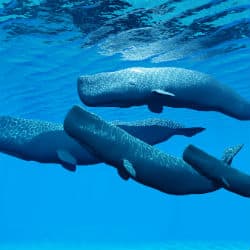The Right Whale Is On The Brink Of Extinction Experts Warn

This year the birthing season for the critically endangered right whale which takes place during winter ended without a single new born calf. This has not occurred for more than thirty years and experts are warning that the incredibly rare species with roams the South East coast of the United States during the winter is a step closer to extinction. Barb Zoodsman who overseas the conservation effort for the species says it is a pivotal moment and if conservation is not taken more seriously it may mark the beginning of the end of the right whale.
Just 450 whales left
In December researchers scoured the oceans off the coasts of Georgia and Florida looking for pregnant whales who usually migrate there every winter in order to give birth in the warmer Atlantic waters. Spotters used airplanes and found nothing at all making it the first-year whale watchers will have recorded no births since they began conducting survey flights in 1989. It is estimated that there approximately 450 North Atlantic right whales left and last year was disastrous for the species. 17 whales washed ashore dead in the US and Canada, well in excess of the five births recorded.
2018 is expected to be terrible
With no births this season it is likely that in 2018 the number will shrink further. Scientists are truly alarmed by the trend because they do not believe that the species can survive such a high mortality rate. On average there about 17 right whale calves born every year for the last three decades. Since 2012 all but two birthing seasons have resulted in less than average calf counts. Scientists are hopeful that the species could rally next year with a dramatic increase in births next year.
Birth rates fluctuate
The female right whale takes approximately three years or more between giving birth which means birth rates fluctuate from year-to-year. The previous low occurred in 2000 with just a single calf spotted. In 2001 however, there 31 new born calves recorded representing the second-best season on record. With the future birth rate uncertain, researcher say more needs to be done to stop humans from causing the death of the species. Last year of the 17 dead whales that were analysed, it was found that four had been struck by ships and a further two died as a result of being caught up in fishing gear.
The sky is falling
Many scientists think that entanglements are part of the reason behind the decline in right whale births. Even when such entanglements are not fatal, the scientists say that the stress induced by the entanglement means it is probably harder for pregnancy to take place. The latest research shows that most adult female right whales die by the age of 30 which is less than half their usual lifespan. Ms Zoodsma says right now for the right whale, the sky is falling but she says she is optimistic that the situation can be turned around if the will power to do it is there.



